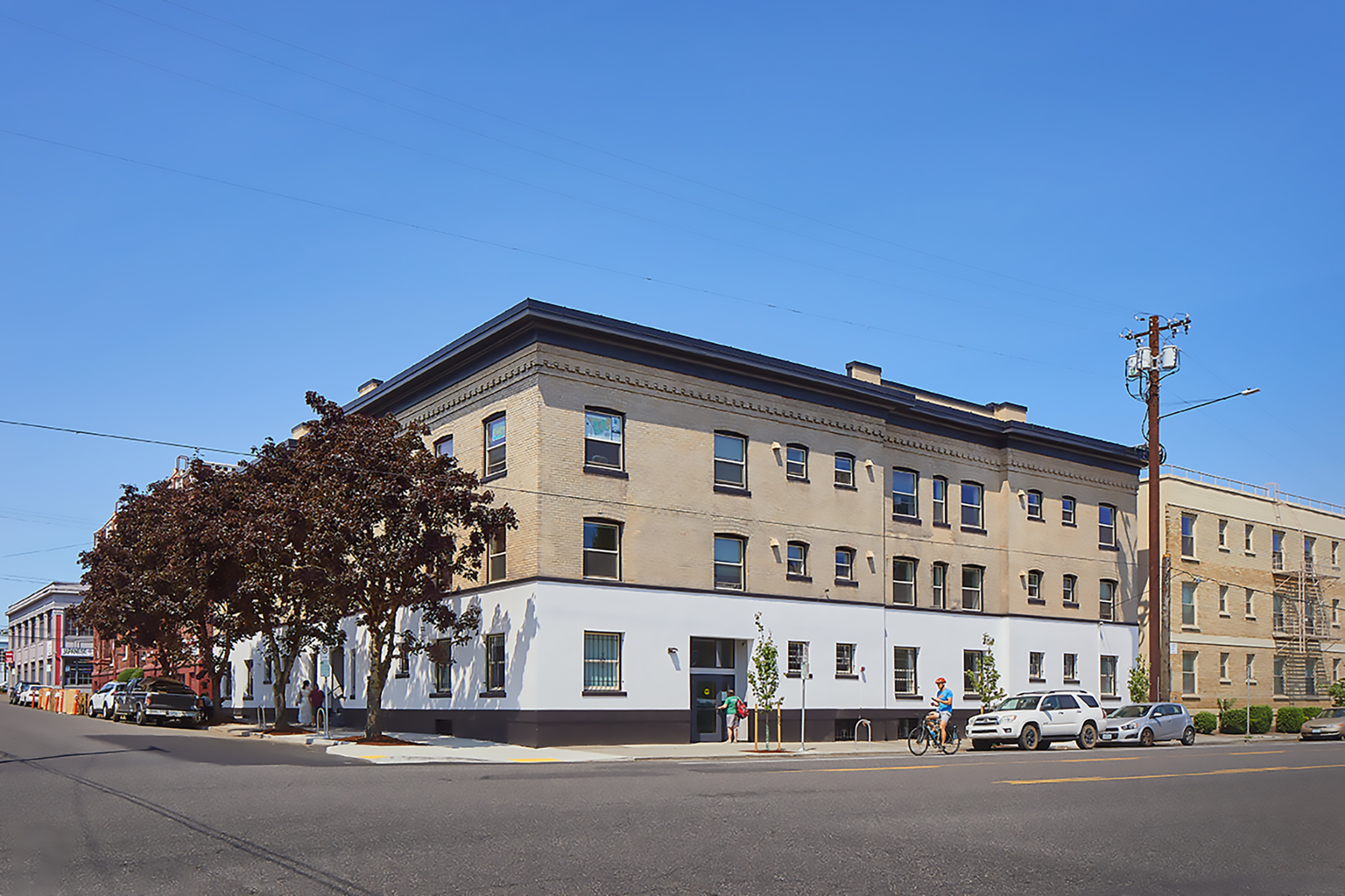Preservation is Reuse. Reuse is Housing Action.
Restore Oregon believes historic preservation and reuse are solutions to the housing crisis, not obstacles. Recognizing that Oregon’s severe lack of affordable and middle housing has led to growing rates of homelessness, the perpetuation of racial inequities, higher rates of illness, dramatically decreased life expectancy, economic segregation, and irretrievable losses in our historic record, Restore Oregon is committed to helping Oregonians preserve existing housing, create new units through internal conversions of vacant and underused commercial and residential buildings, and sustainably develop new mixed-use, multi-family developments through compatible infill in historic districts.
National and state statistics are alarming for both homeowners and renters and especially concerning for those who are low-income (<$30,000/year), older than 65, or are people of color:
- According to the most recent report, 31% of all households were cost-burdened in 2021, meaning they pay more than 30% of their take-home income on housing alone.
- The number of cost-burdened renters has reached an all-time high of 49%.
- There are nearly 250,000 families in Oregon who make less than $33,000 and need affordable housing, but there are only 143,000 units available to house them.
- Oregon had a 22% increase in people experiencing homelessness between 2020 and 2022 – the second-highest increase in the country.
- In its 2023 Annual Homeless Assessment Report, the U.S. Department of Housing and Urban Development reported that Oregon has approximately 20,142 people experiencing homelessness, and 64.6% were unsheltered (those who do not use shelters and are typically found on the streets). This includes 3,900 people with families, making Oregon the leading state for families experiencing homelessness.
- Approximately 40% of America’s current building stock is at least 50 years old, meaning it has reached the threshold to take advantage of federal historic tax credits and other incentives.
This crisis mandates that the preservation of existing housing stock and the reuse of older buildings to create new housing play an important role in housing solutions. This goal is especially critical as Oregon is on the precipice of losing its sole financial incentive for preservation and rehabilitation: the Special Assessment of Historic Properties program (SAHP). Passed in 1975, SAHP was one of the first incentives of its kind in the U.S. Originally conceived as a short-term measure, it has remained in effect for nearly 50 years. Once it expires in 2024, Oregonians will be left without a single state-level policy or financial incentive for preserving or reusing buildings for any purpose. This is unacceptable when Oregon faces an unprecedented rise in vacant buildings, underutilized spaces, empty upper floors, and statewide demolitions.
We must confront the stark reality of inequity, record unaffordability, and housing shortages in Oregon by working to dispel preservation myths and reverse the deleterious effects of poor policy and the lack of preservation and reuse incentives.
Externally, we:
- create and promote a narrative that demonstrates how historic preservation and adaptive reuse contribute to Oregon’s climate change mitigation and housing goals
- build strong collaborative partnerships with housing advocates
- advocate for establishing policies, incentive programs, or flexibilities to enable and promote the adaptive reuse of properties for housing and mixed-use development
- champion the creation of new housing through policies, incentive programs, or flexibilities that enable solutions such as accessory dwelling units, internal conversions of commercial and residential buildings, and compatible infill in historic districts
- increase community/policy-makers’ awareness of adaptive reuse as a tool in housing crisis mitigation
Internally, we:
- Commit time and resources to support Oregon’s effort to create more housing through the preservation and/or rehabilitation of existing buildings and structures
- Identify and prioritize places that provide or have the potential to provide housing
- Intentionally engage in ethnically and culturally diverse programming representing the disproportionate effects of the housing crisis in rural and underserved communities.
- Collect and use data on historic preservation and adaptive reuse for affordable housing projects and create a library of presentations, resources, tools, and data to share knowledge with policymakers and educate the public.
- Collect and leverage data on funding sources for preservation and adaptive reuse housing projects.
There is No One-Size-fits-All Solution to the Housing Crisis.
However, as Oregon’s only statewide nonprofit organization dedicated to advancing the role of preservation and reuse, we believe in using our resources and tools to create housing solutions that promote equity, prevent demolition, and mitigate the negative impacts of climate change.


